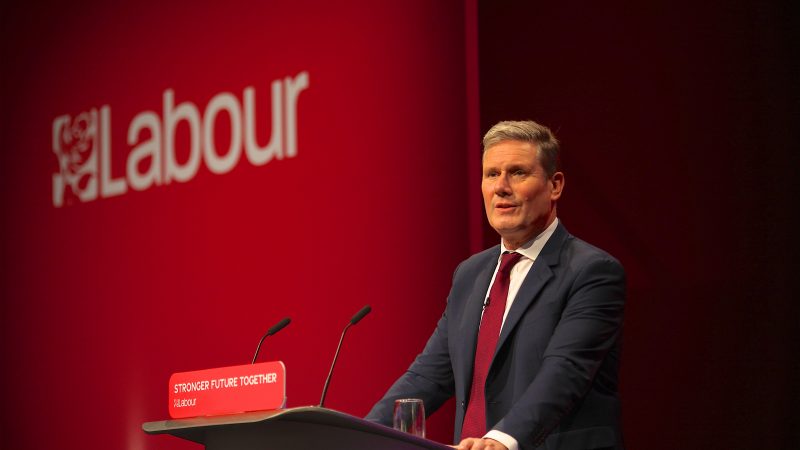
A new report has recommended that the Labour’s task before the next general election is to “offer a new approach to politics”, arguing that the party can “pitch Keir Starmer as an antidote to the chaos of the Johnson years”.
In a new report, titled Lessons from a Landslide and published on the 25th anniversary of the 1997 general election result, Labour in Communications has made six recommendations as to how the party can “revamp its communications approach” before the next general election.
The 12-page document, introduced with a foreword from former Labour director of communications and strategy Alastair Campbell, argued that the success of the Labour leader will “rest upon whether he can neutralise the inevitable criticism that the party is still part of the London Remainer elite”.
In the foreword, Campbell wrote: “As Labour in Communications and Anthony Broxton revisit our strategy and seek to emphasise some of the principles we adopted in 1997 for the different world of 2022 – this is not about a ‘return to New Labour’ – the world has changed so much.
“Labour has to communicate relentlessly the difference it would make. The different policies. The different values. The different approach to what public life is all about.”
“The current government is so bad, its failures and incompetence, misdeeds and lies so epic, it is hard not to think Labour should be far further ahead. It shows yet again how hard it is to win from opposition when the government can often set the agenda.”
The report authored by political historian Anthony Broxton alongside members of the Labour in Communications network said the party must “demonstrate to the British public why Labour values are British values” and advised that Starmer “needs to engage with the right-wing press more actively” to “reflect the mood of the press”.
“While it is important not to indulge in the pure nostalgia of the 1997 campaign, there are clear principles that can be applied to any political communications campaign,” Broxton added.
“As in 1997, Starmer’s task is to win over millions of Conservative voters who have turned away from the party in recent years. By projecting Labour as the party for all of Britain, they stand a good chance of ending the Conservatives decade in office.”
The full recommendations are:
- “Neutralise your opponent’s attack line: Starmer’s success will rest upon whether he can neutralise the inevitable criticism that the party is still part of the “London Remainer elite” that has damaged the party since the Brexit referendum;
- “Making Labour the patriotic party of Britain again: Starmer’s task is to move beyond the flags and demonstrate to the British public why Labour values are British values on a more consistent and impactful basis;
- “Reflect the mood of the press: Starmer needs to engage with the right-wing press more actively. This should focus on the decline of the Conservative Party – tapping into a wider feeling about the deterioration of standards in public life;
- “Simplicity and consistency of message and style: while a simple slogan is just one part of a wider programme for government, the evidence is that it works as much as it did 25 years ago;
- “Address the hung parliament question: rather than go into an election with the idea that the party would enter a coalition with the SNP, the party should outline their position repeatedly and reframe the focus toward getting the Tories out of government; and
- “Offer a new approach to politics: by 2024, single issues such as party-gate will have long faded from view, however, the theme of Johnson’s leadership, and the consequences of his governance, will remain.”
Labour in Communications is a network of around 2,000 Labour Party members and supporters working in corporate communications, public relations, public affairs and government relations sectors across the country.
In a report published last September, the organisation called on Labour to make fewer policy announcements and “concentrate on a handful” already announced in order to “communicate a confident, ambitious and compassionate” party.
The group also holds events with shadow ministers and other Labour figures in leadership positions, such as metro mayor Tracy Brabin. Earlier this year, Shadow Chancellor Rachel Reeves discussed the party’s stance on nationalisation.
Labour in Communications co-founder Nabhan Malik said this morning: “When we started Labour in Communications, we were determined to help build a Labour Party that is ready to tackle the challenges of our time.
“We’re proud of what we’ve achieved in 15 months: welcoming almost 2,500 members, hosting over 40 events with shadow ministers, mentoring 20 people from minority and disadvantaged backgrounds and providing communications support to 20 [Constituency Labour Parties], as well as to some of Labour’s frontbench.”




More from LabourList
Turning the page? Labour’s recovery in the polls show a path to 2029 victory
Restoration announce recommendations for NEC candidates
‘Factionalism at the top is weakening Labour – and handing a gift to Reform’